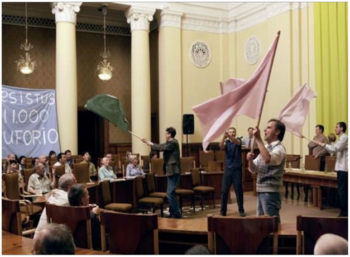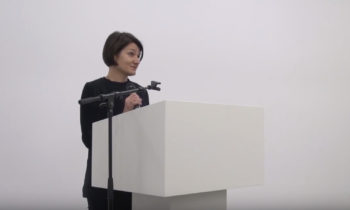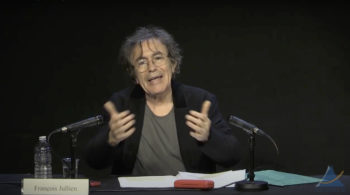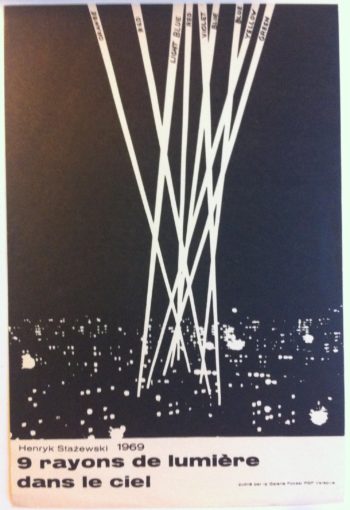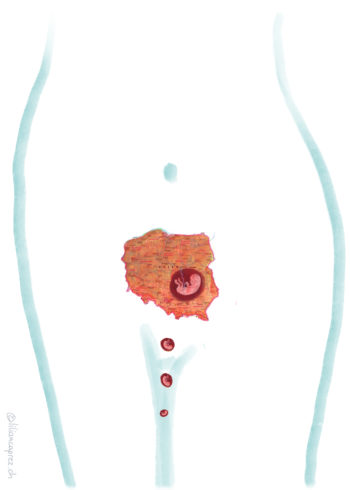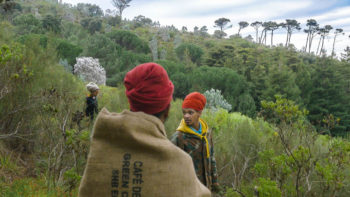Image as gesture: notes on Aernout Mik’s Communitas and the modern political film
Text: Patricia Pisters
Aug 27th 2019
Walking through Aernout Mik’s exhibition Communitas, dwelling in the encounter with the people and situations in front of and on the screens, one is struck by the cinematic and political qualities of the gestures in these powerful video installations. In this article some film-philosophical reflections on the silent performative force of the image as gesture and as politics will be explored.
Read more
An Introduction to the Symposium «Crisis and Communitas»
Text: Dorota Sajewska
Apr 7th 2020
Crisis is a term increasingly heard these days – climate crisis, migration crisis, crisis of representation, identity, masculinity… Contemporary societies often react to crises by installing mechanisms of classification and order. Identitarian communities perceive themselves as an antidote to personal and social crises. On 14 and 15 November 2019, the symposium «Crisis and Communitas. Performative […]
Read more
Cultural change in Poland. The end of conservative consensus or a fascist future?
Text: Tadeusz Koczanowicz
Mar 5th 2020
Comments that appeared in the public sphere after the autumn elections in Poland didn’t take into account an important cultural dimension of the elections. The same can be said about the articles on the upcoming presidential elections in May 2020. People writing about Polish politics seem to look only at surveys or analyze performances of […]
Read more
Transformation. Memory and Matter in Early Polish Capitalism
Text: Dorota Sosnowska
Mar 30th 2020
The process of political and economic transformation which started in Poland in the late eighties is narrated in terms of regaining freedom and establishing democracy. The end of the totalitarian regime also brought the end of censorship and political persecution, the beginning of the free market, and the free flow of commodities. However, on the […]
Read more
Le commun. Lecture by François Jullien
Text: François Jullien
Aug 8th 2020
Common is a double-sided term: As the philosopher and sinologue François Jullien argues, it is both inclusive and exclusive. It can both open and close, oppose its own and identify with it. It is opposed to the universal because it is not enacted as a necessary law, upstream of any experience, but on the contrary […]
Read more
Die Unschärfe zwischen den Strahlen: Henryk Stażewskis Installation «9 rayons de lumière dans le ciel»
Text: Pei Bei Xu
May 28th 2020
Der Kontrast von klaren Linien und Unschärfe, die Position zwischen abstrakter Kunstinstallation und politischer Propaganda: Konzeptuelle Kunst in den späten 1960er-Jahren in der Volksrepublik Polen war ein Balanceakt zwischen individuellen künstlerischen Konzepten und Ansprüchen oder Interpretationen von institutioneller Seite. Dieser Beitrag diskutiert die künstlerische und politische Unschärfe als Mittel sowie die Funktionen des «Dazwischen» an Henryk Stażewskis Entwurf und Installation von «9 rayons de lumière dans le ciel» von 1969/70.
Read more
Polens Opferrolle. Interview mit Dorota Sajewska zur Abtreibungsdebatte in Polen.
Text: Sandra Biberstein
Oct 24th 2020
Am 22. Oktober 2020 hat das oberste Gericht Polens das bereits restriktive Abtreibungsgesetzes verschärft. Die vorsitzende Verfassungsrichterin Julia Przylebska erklärte Schwangerschaftsabbrüche im Falle einer schweren Fehlbildung des Fötus für verfassungswidrig. Warum in der Abtreibungsdebatte der letzten Jahre das «ungeborene polnische Kind» als radikale Manifestation des Opfers einer atheistischen, also nicht-polnischen Gesellschaft gesehen wird und wie diese Opferrolle mit der Geschichte Polens zusammenhängt, erklärte die Kulturwissenschaftlerin Dorota Sajewska im Interview, das im März 2017 geführt wurde.
Read more
Bevor die Pflanzen Namen hatten. Interview mit dem Künstler Uriel Orlow.
Text: Eva Vögtli
Feb 16th 2022
Der Multimedia-Künstler Uriel Orlow befasst sich in seinem Forschungsprojekt «Theatrum Botanicum» mit den Verstrickungen zwischen Europa und Afrika, die weit in die Geschichte zurückreichen. Im Interview mit Eva Vögtli spricht er über die Verdrängung der südafrikanischen Kultur, die während der europäischen Kolonialisierung begann und bis heute anhält.
Read more
